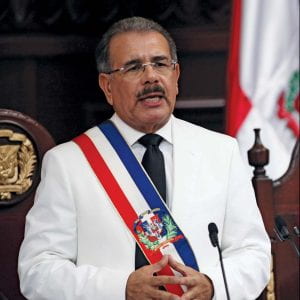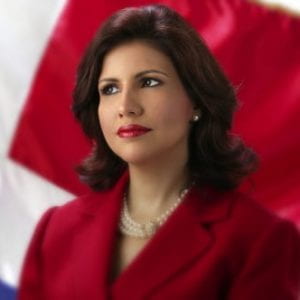Current Political Situation of the Dominican Republic
Rafael Trujillo’s 31-year dictatorship over the Dominican Republic came to an end in 1961 when he was assassinated. After his reign ended, effort went towards trying to establish a democracy for the country.
Today the Dominican Republic does its best to operate as a democracy with regular elections, opposing political parties, checks and balances of the government, and more but still struggles from corruption time and time again. The country is run by an elected president that is voted on every four years; this position is currently held by Danilo Medina. Citizens also elect their members of their bicameral Congress every four years, which is made up of the Senate and the Chamber of Deputies. The country has a Supreme Court but it is appointed by a National Council composed of other government officials. The Dominican Republic also has a variety of different party systems, some major ones being the Dominican Liberation Party, Modern Revolutionary Party, and Social Christian Reformist Party.
The Dominican Republic’s current Constitution (it’s 39th Constitution) claims to guarantee such things as freedom of speech, assembly, religion and so on, but continue to see corruption and violence towards those who try to express them.
The country still suffers with discrimination and crime against women, LGBT, and certain populations like those of Haitian descent. Crime rates within the country continue to be high and overcrowding of prisons is becoming an issue.
Read more here.
Women in Politics In The Dominican Republic
On paper, women in The Dominican Republic have equal rights to men; however, on paper, so do women in America. There are still very strict gender roles imposed on women in the Dominican Republic. They are expected to stay home, bear and rear children, and other stereotypical housewife tasks. There have been movements, led by women to criminalize domestic violence and gender discrimination in the workplace in the Dominican Republic.
Ana Emilia Abigaíl Mejia Soliere, perhaps better known as Abigaíl Mejia, was a feminist and activist in the Dominican Republic in the ’20s and ‘30s. She was an activist during Trujillo’s regime and was the person who really began the movements to gain women’s suffrage. Abigaíl Mejia was trained as a teacher and returned to the Dominican Republic after going to school and living in Spain for many years. She began to educate women in the underprivileged parts of the Dominican Republic in addition to writing and working with historians on research.
In 1942, women won the right to vote through articles 9 and 10 of the constitutional reform. In the 90’s, women’s demands for better representation in government increased and as a result a female quota law was established, which required 25% of all candidates for elected positions to be women; it has since increased to 33%.
Due to the recent democratization of the Dominican Republic, there has been an expectation of modernization of the gender gaps in politics, that is to say, the reduction of the gaps. Centro de Investigacio´n para la Accio´n Femenina was a prominent feminist group in the 1990s that led to women having more access to rights as well as elected positions in government. From this point on, women’s issues became more prominent in the platforms of candidates and it became common for the speeches and vernacular of the candidates for elected positions to use gender-inclusive language.
Currently, the Vice President of the Dominican Republic is a woman: Margarita Cedeño de Fernández. Fernández was elected in August 2012 and was previously the first lady of the Dominican Republic from 2004-2012. There have been many moves to establish equality for women both in and out of politics in the Dominican Republic, but there is still much more to be done.
Read more here.
Oppressive Regimes in the Modern World
The early to mid-1900s saw the rise of numerous ruthless dictators around the world. Rafael Trujillo of the Domincan Republic is just one name that gets lost on a list of more powerful dictators of the time that includes Adolf Hitler, Joseph Stalin, and Mao Zedong. Since the formation of the United Nations after World War II, it would seem that the world has made great progress in preventing the spread of new totalitarian regimes. Yet, though arguably not as powerful Hitler and Stalin’s governments, oppressive regimes are still just as prevalent in the modern world.
In the Middle East, Bashar al-Assad, president of Syria, has waged a civil war to put the entire nation under control of his regime. He has been accused of using chemical weapons among other crimes deemed as human rights violations by the UN. The various groups opposing the Assad Regime are no better; The Islamic State of Iraq and Levant (ISIL) and Hayat Tahrir al-Sham are bands of violent extremists, many with former ties to terrorist groups such as al-Qaeda.
Eastern countries also have their fair share of political oppression. In the Phillipines, President Rodrigo Duterte has waged a “war on drugs” that has put his country in an uproar. Duerte has attempted to reinstate the death penalty, saying its purpose was intended for criminals and drug dealers. He even promotes vigilantism, offering rewards to those that bring him the head of a drug dealer. Duerte also has tried to make weapons deals with Russia, a country which still continues to suffer freedom of speech issues and opposition of the government as it did under Stalin. Under the control of President Vladimir Putin, there have been countless murders and reports of missing journalists, proving just how little speech rights there are in Russia.
Kim Jong-Un is perhaps the most ruthless and well known of the modern era of dictators. Supreme Leader of North Korea since 2011, when he succeeded his father Kim Jong-Il, Kim Jong-Un runs a nation isolated from the outside world, one in which he requires unabiding loyalty to his rule. Like Trujilo and other famous dictators before him, Kim Jong-Un controls a secret police force, the State Security Department (SSD), that instills fear in its people in order to maintain suffocating control over North Korea. It is estimated that the SSD currently has imprisoned over 120,000 citizens in prison camps for “political crimes” without trial. Prisoners in these camps are reportedly starved, raped, tortured, and forced to work. Public executions of prisoners and even high-ranking government officials are also common, to further discourage dissent. Kim Jong-Un’s policies are strikingly effective, and there appears to be no end in sight for his regime.
Read the full story here.
In the Time of the Butterflies Homepage
Stephen Odgers, Hannah Summers, Austin Maaddi, & Emma Marek, 2019





